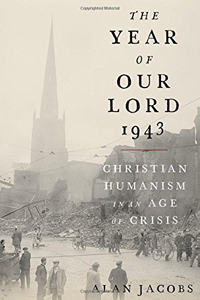 Alan Jacobs, The Year of our Lord 1943: Christian Humanism in an Age of Crisis (New York: Oxford University Press, 2018), 280 pages.
Alan Jacobs, The Year of our Lord 1943: Christian Humanism in an Age of Crisis (New York: Oxford University Press, 2018), 280 pages.
A review by Brad Keister, former Deputy Division Director of the Physics Division for the National Science Foundation.
Although the final armistice was ultimately two years away, to many people in 1943 it was becoming clear that the Allies would eventually prevail in World War II. At the same time, several Christian intellectuals independently concluded that Western civilization was unprepared for the real task of world leadership that lay ahead. Alan Jacobs, Distinguished Professor of the Humanities in the Honors Program at Baylor University, chronicles the lectures, writings and activities of five such critics: T. S. Eliot, Jacques Maritain, C. S. Lewis, Simone Weil, and W. H. Auden. Their journeys, and their faith positions, were all quite different, and there was no coordinated effort among them to make any sort of common statement. Yet there were common threads of concern among them.
The force of opinion in the West was that the worldview of Nazi Germany was evil, but the question was how to achieve a post-war society that did not pose the same risks of evil. Western victory owed much of its success to scientific advances in radar, encryption, and nuclear physics, but would a purely science-based authority lead to the desired outcome? What authority, if any, would the organized church hold in a democratic society?
Jacobs concludes that the men and women featured in his book came on the scene too late to alter the rising influence of science and technology as a hegemony that discounted philosophical and religious perspectives. Yet he also offers hope that it is not too late for a new generation to take up the cause. With contemporary concerns like gene editing and artificial intelligence (just to name two), the field is ripe for modern-day approaches to the questions raised in this book, and it is a key reason why Jacobs chose to write it.
Dan Clendenin: dan@journeywithjesus.net


